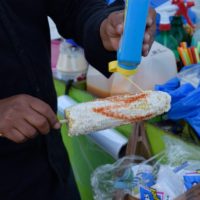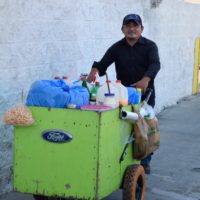A lime green cart bumps along Vanowen Street, a pop of color against the gray concrete. The cart’s bell jingles as the wheels maneuver over the cracks in the sidewalk. With its chipped coat of paint, the wood near the bottom shows its true signs of wear.
A man pushes the cart as he honks his horn. The honking serves as his call to every home he passes. Otherwise, he is quiet as he strolls down the street, pushing his green sidekick along the path, his cart bursting with wares.
This man is Juan Poodmx and the cart is his sole income for his family. Poodmx is a 30-year-old street vendor serving Los Angeles County, providing Mexican comfort food to the Canoga Park and Winnetka areas.
The green cart that Poodmx built has been the other half in a one-man business of selling Mexican-style corn and street food that is commonly found in his hometown of Mérida in Yucatán, Mexico. He says he decided to come to America to sell because he needed new customers.
“I came here when I was 20 years old,” Poodmx says. “I didn’t have any job when I got here, but I needed to help my family.”
Poodmx has equipped his cart with a large metal pot that holds steaming ears of elotes, a Mexican style corn-on-the-cob. Poodmx also sells bags of chicharrones, which are pieces of fried pork crackling that he coats with a hefty squirt of chile and a spray of lemon juice. Poodmx is quite comfortable in this business of nomadic vending.
“I’ve been selling corn around here for 10 years,” Poodmx says. “I know what I have to do and how long it takes me to do it.”
Jars of various sizes clutter the small area, holding the mayo, crumbled cheese and squeezable butter- iconic items used to dress up a traditional elote. Also on the cart is a big block of ice for shaving his own raspados, a Mexican version of shaved ice and syrup.
In addition to serving traditional syrup that Americans use to cover shaved ice, including cherry and blueberry, Poodmx also serves homemade Tamarindo, a popular Mexican drink made of juice from the Tamarind legume boiled with sugar.
Poodmx has been at this for a while, so preparing his cart each day has become second nature to him.
“Everything is quite easy and quick for me to prepare,” Poodmx says. “The only thing that takes time to make is the Tamarindo, which is natural. I make it fresh daily.”
With a desire to support his family, he leaves his home in Mérida for two-to-three-year spurts to come to LA and collect his business earnings. Once he has stayed long enough, he travels back home to be with his family.
“I do all of this to lift my family up, to bring them forward and closer to success so that we can all be happy,” Poodmx says.
Up the street, atop a set of stairs of a duplex, there is a woman who waves to get Poodmx’s attention. They nod to each other, too far apart to hear any words, but close enough to share a mutual understanding. Poodmx stops his cart at the edge of a fence that leads into her building as he waits for her.
Vanessa Mena has been Poodmx’s customer for around three years since she moved to the area.
“I absolutely love the way he makes his elotes,” Mena says. “His products taste fresh, and he just knows how to make the corn taste better than it’s ever tasted before.”
Along with Mena, others in the neighborhood flock to Poodmx as he passes with his cart, ready and eager to buy his corn and snacks.
“I like this community,” Poodmx says. “They are very loving and generous.”
Although it is now legal to be a street vendor, Poodmx hasn’t let his guard down when it comes to roaming the streets.
“It is not uncommon for the police to take my cart from me or cite me,” Poodmx says. “It sucks because all they do is throw it in the trash.”
To accommodate this struggle, Poodmx keeps a few extra carts in his home so that he doesn’t lose a day of work.
Veronica Bauchman is the bureau director of the LA County Department of Public Health. She specializes in many programs, including the Street Vending Compliance Program.
With the legalization of street vending, Bauchman strives for all roaming vendors to become licensed. Most street vendors’ carts are so small that they don’t have room for carrying sanitation of any kind, Bauchman says.
“It’s really unsafe for both the sellers and the customers when it comes to business on the streets,” Bauchman says. “Those who don’t have permits must rely on their empathy for fellow humans to conduct their business up to health code standards.”
Poodmx makes sure that his products are safe for his customers to consume.
“My entire business is dependent on my loyal customers,” Poodmx says. “If I make someone sick, they won’t buy from me and they will spread the word that I’m not a good vendor.”
Poodmx says that he isn’t seen as a vendor in the eyes of the government, which is one hurdle he chooses not to go over.
“I’ve tried getting a permit in the past,” Poodmx says. “It’s just impossible for us to get one.”
With the worry of not complying with county rules, Poodmx fears citation from the police every day he ventures to work.
“It sounds scary, but it’s not so bad,” Poodmx says. “I am friends with other elote vendors and we work together to stay safe. There’s nothing else I’d rather be doing.”






